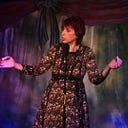Member-only story
Its Not Magic: How “Heroic Improv” Training Can Bring Out Our Best At The Worst Of Times

Its a Sunday night about 9:30 pm in early June of 2020. A certain grim acceptance that the pandemic is not going to end soon has given rise to an underlying current of anxiety in my body and household. Suddenly my husband and I are bolted from our TV-watching comfort coma by a blast from both our phones that a tornado has been spotted in the area. Not a tornado “watch.” A “get in the basement now” warning. My stomach drops as I stare at the phone in disbelief, my fight-flight-freeze instinct stopped at freeze. My husband is all “fight.” He pushes me to the stairs, then closes the door to the basement behind me. “I’ll get the cats,” he yells, pushes them through the door moment later, then closes the door again. “We need the big flashlights! We need them all,” he yells. “No, no no!!!” I say, knowing that by the time you can hear a tornado it can be too late to get to safety, also knowing there is no flashlight big or strong enough for my safety-obsessed husband in state of high alert. He finally descends, fully loaded with flashlights. Ten minutes go by. “Water!” I think. “If the tornado hits our house, we need water down here.” This makes no objective sense. We both know we should stay in the basement but feel oddly more in control by running up and down the stairs for supplies we may need if we have to fight our way through the pile of rubble that might soon be what’s left of our home. But we help each other focus. As a team, we make better choices than either of us would on our own.
It is possible to train and prepare to make effective moment-to-moment choices, prioritizing and problem-solving necessary during “no-notice” events like this. Heroic Improv, a model developed by researcher Dr. Mary Tyszkiewicz, (Dr. T) author of the chapter “Practicing For The Unimaginable: The Heroic Improv Cycle” in the groundbreaking book Applied Improvisation: Leading, Collaborating and Creating Beyond The Theatre helps small groups respond to high-stakes crises through training, facilitation and evaluation. Dr. T uses improv principles and exercises to train for exactly this kind of scenario. “The beginning of an improv scene feels exactly like a disaster,” she explains. “In both situations, people don’t know where they are at, whom they are with or what is next.”
